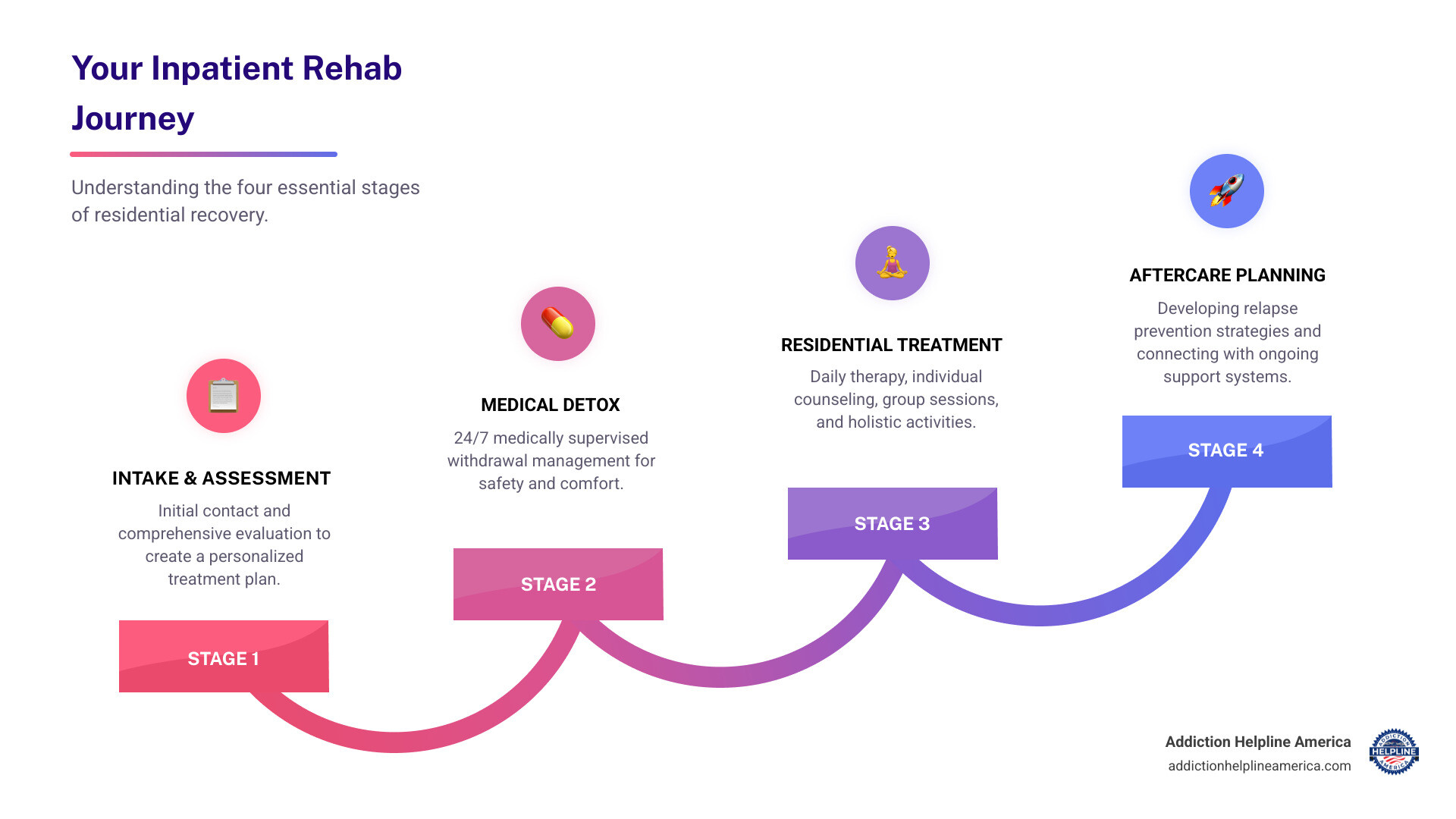
Finding Hope: Your Guide to Overnight Rehab Centers
Overnight rehab centers near me provide 24/7 residential care for individuals struggling with substance use disorders. Making the decision to seek help is a monumental step, and understanding your options is crucial. Here’s what you need to know right away:
Quick Overview of Overnight Rehab Centers:
- What They Are: These are residential treatment facilities where you live on-site for the duration of your treatment. They are also commonly called inpatient rehab, providing a fully immersive therapeutic environment.
- Duration: Programs typically range from 30 to 90 days. The journey often begins with a medical detox phase, which can last from 3 to 7 days, to safely manage withdrawal symptoms before transitioning into the core therapeutic program.
- Who They Help: They are ideal for individuals with moderate to severe addiction, those with co-occurring mental health conditions (like depression or anxiety), people living in unstable or triggering home environments, or anyone who has not found success with less intensive outpatient care.
- What’s Included: Comprehensive care includes medically supervised detox, 24/7 medical and clinical support, individual and group therapy sessions, holistic services (like yoga or meditation), nutritious meals, and highly structured daily activities designed to build healthy routines.
- Cost: The cost varies widely based on the facility, location, and services offered. Many centers accept private insurance (PPO/HMO), public options like Medicaid and Medicare, or provide financing and sliding scale payment plans to make treatment accessible.
When you’re facing the overwhelming challenge of addiction—whether it’s your own struggle or a loved one’s—finding the right treatment can feel impossible. The sheer volume of information and options can be paralyzing. The good news is that overnight rehab centers offer a safe, structured, and supportive environment where recovery becomes the sole focus. By removing you from daily triggers and stressors, these programs allow you to dedicate your full energy to healing. Research consistently shows that treatment stays of 90 days or longer result in better long-term patient outcomes, giving you or your loved one the necessary time to build a strong foundation for lasting sobriety.
These facilities provide more than just a place to stay. They offer comprehensive, integrated care that addresses the root causes of addiction, treats co-occurring mental health conditions, and equips you with the practical tools to maintain sobriety long after you leave. From medically supervised detox that ensures your safety and comfort to evidence-based therapies that rewire thought patterns and holistic practices that heal the mind and body, overnight rehab centers create a complete therapeutic ecosystem where healing can truly begin. When choosing a facility, it’s also important to look for proper accreditation from bodies like CARF (Commission on Accreditation of Rehabilitation Facilities), which signifies a commitment to high-quality care and patient outcomes.
At Addiction Helpline America, we’ve helped countless individuals and families steer the often-confusing landscape of addiction treatment. We specialize in connecting people with quality overnight rehab centers near me that match their specific clinical needs, financial situation, and personal preferences. Our team of experienced addiction specialists understands that finding the right facility is the most critical first step on the path to recovery, and we are here to provide confidential, no-cost guidance.
This guide will walk you through everything you need to know about overnight rehab centers—from understanding what inpatient treatment involves to finding accredited facilities, navigating insurance coverage, and planning for life after treatment. We’ll help you make informed decisions so you or your loved one can find the right environment for healing.
Call Now – Your Journey to Recovery Begins Today!

Take the first step towards a healthier life! Call now to connect with our compassionate team and start your recovery journey today. Your path to healing awaits!
Our recovery specialists are available 24/7 to provide support, and all calls are confidential and free. Reach out anytime – we’re here to help!
Who benefits most from overnight rehab?
- People who have tried outpatient care without success or experienced repeated relapse
- Individuals with moderate to severe substance use disorders who need medical monitoring
- Anyone in an unsafe, unstable, or highly triggering home environment
- Those with co-occurring mental health concerns who need integrated, coordinated care
- Individuals seeking a structured routine and accountability to rebuild daily habits
How admission typically works
- Initial confidential assessment to understand needs, safety concerns, and program fit
- Insurance verification and a transparent explanation of costs and coverage
- Pre-admission planning for detox if needed, including safe transportation options
- Packing guidance and arrival instructions; intake and orientation upon arrival
What to bring (and what to leave at home)
- Bring: ID, insurance card, a list of medications and allergies, comfortable clothing, basic toiletries, and contact information for key family members or providers
- Leave at home: drugs or alcohol, weapons, valuables, and restricted items outlined by the facility (such as certain electronics or aerosols)
These simple steps can ease uncertainty and help you arrive prepared and focused on recovery. If you are unsure which level of care is appropriate, Addiction Helpline America can provide a confidential, no-cost assessment and help you compare high-quality programs nationwide.

Similar topics to overnight rehab centers near me:
- inpatient rehabilitation program
- 30 day inpatient program
- alcohol rehab inpatient residential program
Understanding Inpatient Treatment
When you’re searching for overnight rehab centers near me, you’re likely looking at what’s professionally known as inpatient or residential treatment. This is the most intensive level of care available for addiction, and it’s specifically designed for people who need a comprehensive, immersive environment to overcome their substance use disorder, rather than just weekly therapy sessions.
Inpatient treatment means you live at the facility 24/7 during your recovery program. You’re not just visiting for a few hours and then heading home—you’re staying there day and night, typically for weeks or months. While this might sound intimidating, for many people, it’s the essential step needed to break free from the powerful cycle of addiction. This residential model creates a “therapeutic community” where you are surrounded by peers on the same journey and a dedicated team of professionals.
The cornerstone of inpatient care is its 24/7 structured care. This means there’s always someone available—medical professionals, licensed counselors, and support staff who can help you at any hour. If you’re struggling with intense cravings or withdrawal symptoms at 3 a.m., a nurse is ready to provide medical support. If you’re having a difficult emotional moment or a breakthrough, a counselor is there to talk you through it. This constant availability provides an unparalleled level of safety, accountability, and reassurance during one of the most vulnerable times in a person’s life.
What makes inpatient treatment so powerful is the seamless integration of medical and emotional support. You’re not just detoxing your body from a substance; you’re also healing the psychological, emotional, and behavioral aspects of addiction. The medical team monitors your physical health, manages withdrawal symptoms, and addresses any co-occurring health issues. Simultaneously, therapists help you uncover the underlying causes of your substance use, develop healthier coping strategies, and build emotional resilience.
How inpatient care differs from other levels of care is significant. Outpatient programs allow you to live at home and attend treatment sessions during the day. While this offers flexibility, it also means you return to your daily life, with all its potential triggers and stressors. For individuals with severe addiction, a history of relapse, or an unstable home environment, this can make recovery incredibly difficult. Inpatient care offers a complete separation from those triggers, providing a protected space where the sole focus is on getting well.
Call Now – Your Journey to Recovery Begins Today!

Take the first step towards a healthier life! Call now to connect with our compassionate team and start your recovery journey today. Your path to healing awaits!
Our recovery specialists are available 24/7 to provide support, and all calls are confidential and free. Reach out anytime – we’re here to help!
The American Society of Addiction Medicine (ASAM) categorizes treatment into different levels based on intensity. Inpatient and residential programs fall under Level 3 (Residential/Inpatient Services) and Level 4 (Medically Managed Intensive Inpatient Services). Level 3 provides 24-hour care with trained counselors, while Level 4 offers the highest level of care with 24-hour nursing and daily physician care, essential for individuals with severe, unstable medical or psychiatric conditions. Understanding these distinctions helps you and your care provider make an informed choice about what level of care is right for you or your loved one.
For more information about the full spectrum of available options, visit our page on treatment options.
| Feature | Description |
|---|---|
| Intensity | High-level, 24/7 care with constant medical and therapeutic support in a highly structured environment. Daily schedules are packed with therapy, education, and activities to maximize healing. |
| Environment | A residential setting where you live at the facility full-time. This removes you from external triggers and stressors, allowing for a complete focus on recovery within a supportive community. |
| Support | Round-the-clock access to medical staff (nurses, doctors), licensed therapists, case managers, and peer support. This ensures immediate help for medical issues, emotional distress, or cravings. |
| Cost | Typically higher than outpatient care due to the inclusion of housing, meals, and 24/7 staffing. However, many insurance plans provide significant coverage for this level of care. |
| Ideal Candidate | Individuals with severe substance use disorders, co-occurring mental health conditions, a history of relapse, an unstable or non-supportive home environment, or those who require medical supervision for detox. |
The bottom line is this: inpatient treatment creates a protective bubble around you during the most critical phase of recovery. It removes you from the chaos, the triggers, and the daily stressors that may have contributed to your addiction in the first place. Instead, you’re placed in a therapeutic environment where every element of your day—from individual therapy to group meals—is intentionally designed to support your healing and build a foundation for a new way of life.
What a typical day looks like
- Morning: Vital checks, healthy breakfast, and a mindfulness or goal-setting group
- Daytime: Individual therapy or psychiatry appointments, skills groups (for example, CBT), educational workshops, and exercise or recreational time
- Afternoon/Evening: Process groups, family sessions when appropriate, therapeutic activities, dinner, and wind-down routines to support sleep hygiene
Your care team
- Medical providers oversee detox needs, medications, and physical health
- Licensed therapists facilitate individual and group therapy and develop personalized treatment plans
- Case managers coordinate insurance, discharge planning, and aftercare resources
- Support staff ensure safety, structure, and encouragement throughout the day and night
Family involvement and boundaries
Programs often include family education and therapy to rebuild trust, improve communication, and establish healthy boundaries. Involvement is coordinated to protect your privacy and to support your recovery timeline, with visits or calls scheduled according to clinical guidance.
Safety, privacy, and medication management
Facilities follow strict safety and privacy standards. Medications are stored and administered according to policy, and clients receive ongoing assessments to adjust care as needs evolve. These safeguards help stabilize both physical and emotional health while you focus on recovery.
Planning for aftercare from day one
Effective inpatient programs start discharge planning early, identifying supports such as intensive outpatient care, sober living, peer groups, and ongoing therapy. A clear aftercare plan bridges the transition back home and significantly reduces relapse risk.
Our helpline is 100%
free & confidential
If you or someone you care about is struggling with drug or alcohol addiction, we can help you explore your recovery options. Don’t face this challenge alone—seek support from us.
Programs
Resources
Will my insurance
cover addiction
treatment?
We're ready to help
Find the best
drug or alcohol treatment
center
Are you or a loved one struggling with addiction? Call today to speak to a treatment expert.















